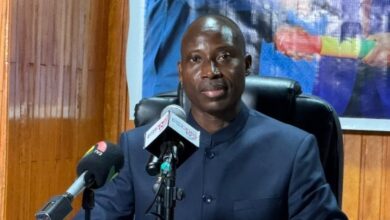
By Emmanuel DANKWAH
The global economic landscape in early 2025 is characterized by a delicate balancing act. As highlighted in the International Monetary Fund’s (IMF) January 2025 World Economic Outlook (WEO), while global growth is projected to remain steady at 3.3 percent in 2025 and 2026, the near-term outlook presents divergent paths. The anticipated easing of monetary policy in advanced economies, driven by declining inflation, offers a glimmer of hope for emerging markets and developing economies. However, persistent inflationary pressures, particularly within the services sector, and geopolitical uncertainties necessitate a cautious approach to monetary policy across the globe.
The new Governor of the Bank of Ghana (BoG), Dr. Johnson P. Asiama spearheaded his first MPC meeting with the focus on achieving macroeconomic stability. Governor Asiama in his press release indicated a hike of the monetary policy rate (MPR) by majority decision to re-anchor the disinflation process. According to the Governor, the committee will reassess the scope for a gradual easing in the policy stance.
The recent decision by the BoG to raise its MPR by 100 basis points from 27 percent to 28 percent – the first time since September 2024 – has sparked debates. While the general expectation prior to the MPC meeting was for easing, the hike is a prudent and justifiable measure aimed at reinforcing macroeconomic stability. This move comes at a time when Ghana, like many emerging economies, faces a complex interplay of domestic and external economic forces.
While inflation has witnessed a marginal decline to 22.4 percent in March 2025 from 23.8 percent in December 2024, it remains significantly above the central bank’s medium-term target band of 6-10 percent. This, coupled with concerns about fiscal policies, liquidity overhang, and prevailing geopolitical risks, provides a strong rationale for the MPC’s decision. The hike signals a firm commitment to re-anchor inflation expectations and build resilience against potential future price pressures.
The global disinflation process, while underway, faces potential headwinds. Renewed inflationary pressures in the services sector could interrupt anticipated monetary policy easing in most advanced economies, with implications for global financial conditions and capital flows to emerging markets. In this environment, Ghana’s proactive stance to tighten monetary policy serves as a crucial buffer against potential external shocks and helps to maintain investor confidence.
The amplifying impact of the trade war
The global trade landscape has become increasingly fractured due to recent trade wars, primarily involving the United States, China, and the European Union. These disputes, characterised by escalating tariffs and retaliatory measures, have several consequences for economies worldwide, including Ghana.
Key Impacts on Ghana:
- Higher import costs: The trade war increases input costs for Ghanaian businesses. For instance, additional tariffs on exports to the US are temporarily suspended, but the larger issue remains the disruption in global supply chains, increasing the cost of imports.
- Weakened demand: Global trade slowdowns can harm Ghana’s exports, especially commodities like cocoa, gold, and oil. A slower global economy means lower demand for these key exports.
- Exchange rate volatility: Increased global uncertainty often leads to capital flight, impacting the Cedi. The MPR hike aims to make local assets more attractive, stabilizing the exchange rate.
- AGOA implications: Ghana’s access to the African Growth and Opportunity Act (AGOA) market has been affected, particularly by the imposition of new tariffs on exports to the US. This escalates the urgency for domestic economic resilience.
The need to safeguard economic stability
In an era of heightened global uncertainty from trade wars, geopolitical tensions, and volatile commodity prices, the need for countries to proactively safeguard their economic stability has become paramount. Ghana’s recent experience with high inflation and exchange rate depreciation underscores this necessity.
- Building resilience against external shocks: A stable macroeconomic environment enhances a country’s ability to recover from external shocks. A higher MPR contributes to this stability by anchoring inflation expectations and reducing vulnerability to currency depreciation.
- Maintaining investor confidence: In an uncertain global economic landscape, investors prioritize stable and predictable economies. A decisive monetary policy action like the MPR hike signals the Bank of Ghana’s commitment to price stability and macroeconomic prudence, which can help maintain and attract foreign investment.
- Preventing a vicious cycle: High inflation and a depreciating currency can create a vicious cycle, eroding purchasing power and further fueling inflation. A proactive monetary policy response aims to break this cycle and establish a foundation for sustainable growth.
- Preserving long-term growth prospects: While short-term tightening might moderate growth, long-term sustainable growth is predicated on a stable macroeconomic environment. By tackling inflation now, the Bank of Ghana is laying the groundwork for a more predictable environment for businesses and the economy to expand.
Implications for businesses
The increase in the MPR will have implications for businesses operating in Ghana. The most immediate impact will be a likely rise in borrowing costs. Commercial banks use the MPR as a benchmark for lending rates, which will likely rise, making credit more expensive.
- Increased operational costs: Businesses with existing loans will face higher repayment burdens.
- Delayed or scaled-down investment plans: Higher borrowing costs may deter businesses from undertaking new projects.
- Challenges for SMEs: SMEs, which rely more on external financing, may find it harder to access affordable credit.
- Potential pass-through to consumers: Businesses may pass on increased borrowing costs through higher prices.
However, this short-term pain is intended to pave the way for longer-term stability. A stable macroeconomic environment can reduce the cost of imported inputs and benefit businesses in the long run.
Implications for the general economy
The MPR hike will also have broader implications for the economy:
- Slower inflation: The objective of the rate hike is to dampen demand, mop up excess liquidity, and curb inflationary pressures.
- Exchange rate stability: A higher MPR can make Ghana’s assets more attractive, increasing demand for the Cedi and contributing to stability.
- Impact on household consumption: Higher loan interest rates will increase the cost of borrowing for households.
- Increased savings: Higher interest rates could incentivize households to save more.
- Potential for slower growth in the short term: Monetary tightening could lead to a temporary slowdown in activity. However, this is a trade-off the central bank deems necessary for long-term price stability and growth.
Considering the impact of the recent trade war and the need for Ghana to safeguard economic stability in this global context, the Bank of Ghana’s decision to increase the monetary policy rate to 28 percent is a considered response. While this hike will present short-term challenges, it is a necessary step to anchor the disinflation process and build resilience.
Businesses must adapt to this environment, and the success of this policy depends on complementary fiscal discipline and reforms. Ghana’s MPR adjustment reflects a commitment to navigating these complexities with a focus on long-term economic well-being.
The writer is a Financial Economist and Data Analyst. His areas of interest include financial market, Ethics, Sustainability, Financial Literacy, AI and data analytics.
He can be reached via edankwah05@gmail.com




